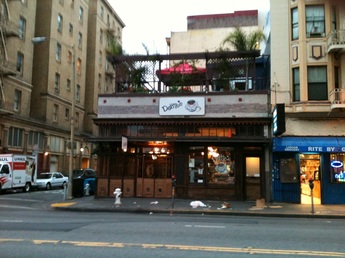 Dottie's True Blue Cafe / Alison R. Dottie’s True Blue Cafe on Sixth Street between Market and Mission is in a scruffy part of the city, where the homeless, alcoholics, druggies, the unlucky ones pass by. Yet here, tourists and locals line up around the block into the alley to have breakfast, willing to disregard that this is not a “cute” street with fun shops.
I was outside Dottie’s on Friday at 8 a.m. for breakfast. Arriving earlier than my friend, Corky, I waited for her on the street when a man passed wearing like a necklace a sign that read, “I Am Loved.” My first thought was 12 Step Program, quickly followed by admiration and then a “What If” question. What if we all believed that we were loved? What if we all knew that, as John Welwood* says, “boundless love always manages somehow to sparkle through” our imperfect selves.
By the time I thought of running after the man to ask about his belief that he was loved, the man was almost to Market. I couldn’t chase him down and keep my place at the front of the line that was forming behind me, the line that would eventually turn the corner down the alley.
What about that very public proclamation: “I Am Loved.” Is it wishful thinking? In which case there’s something silly and sad about the misconception that what you wish for is actually true.
To think wishfully is to interpret facts, reports, events, perceptions, etc., according to what you would like them to be rather than to the actual evidence. The Skeptic’s Dictionary goes so far as to declare that if wishful thinking is done intentionally and without regard for the truth, it is called misinterpretation, falsification, dissembling, disingenuous, or perversion of the truth.
But I think knowing you are loved and saying so is not wishful thinking at all; rather I call it “worshipful thinking.”
John Welwood says in Perfect Love, Imperfect Relationships, “Absolute love is a light that shines through us, from what lies altogether beyond us, the ultimate source of all. We are the channels through which this radiance flows. Yet in flowing through us, it also finds a home within us, taking up residence as our heart-essence.”
Until that morning I had not seen any persons disheveled or sprawled on the sidewalk so clearly show that they know they are loved. For many, pain and suffering has sent them into addiction, or they have been swallowed up by mental illness. Perhaps the recognition that love is their nature has eluded them.
To see the extremes of the human condition reminds me that extreme is different only by degree from the condition of all beings. We all have pain in our pasts; many of us were not loved and have struggled to maintain or become ourselves. And many of us are lucky, lucky not to have been overwhelmed by the ragged aspect of ourselves.
The man whose jewelry says “I Am Loved” really states the obvious. Mostly we think love is outside ourselves and needs to come from other people if we are to experience it. In fact, love and loved is who we are already.
Welwood says we have perfection at the core of our nature. For me it is good to be on Sixth between Mission and Market. Looking at the distress that exists along the street can be a reminder that some kind of breakdown is usually necessary before a breakthrough allows us to experience a new way of living less encumbered by past conditioning.
Before long, Corky joined me, and we were seated at a communal table in a crowded Dottie’s True Blue Café. I told her about the man with the sign saying “I Am Loved” and she told me about words once scratched into the cement on the sidewalk along Castro Street, words she said have been paved over but could be rewritten with colored chalk. “May you feel loved just as you are.”
That is my wish-filled thought for all beings on every street, in every neighborhood: be they lying, sitting, standing or walking. That is my wish for Corky and my wish for me.
*John Welwood has published more than fifty articles on relationship, psychotherapy, consciousness, and personal change, as well as eight books including Journey of the Heart, Love and Awakening, Toward a Psychology of Awakening and Ordinary Magic; and Perfect Love; Imperfect Relationships.
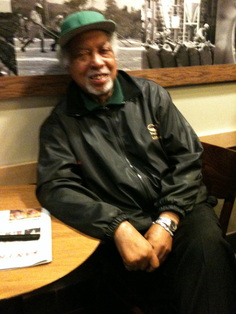 Neighbor Abe at Starbucks/Alison R. Mother Theresa, Fred Rogers of the PBS show “Mr. Roger’s Neighborhood” and I have one thing in common. We value the people we meet wherever we are.
Show after show, Mr. Rogers put on his cardigan, laced up his indoor shoes and sang about the people in the neighborhood, asking his TV audience, “Won’t you be my neighbor?” He knew the value of those whose lives touch ours.
Mother Theresa said, “Every time you smile at someone, it is an action of love, a gift to that person, a beautiful thing.” And she said, “Go out into the world today and love the people you meet. Let your presence light new light in the hearts of people.”
I think a lot about the people whose paths I cross. Their wellbeing is what feels like religion to me. It is the first principle of seven that guide Unitarian Universalists in lieu of this religion having belief requirements. It is also the ultimate meaning of becoming a bodhisattva if you follow the precepts of the Buddha and hope to use your awakened state for the good of all beings.
In my neighorhood, there are people to greet as I walk from the Safeway parking lot between Webster and Fillmore to the Starbucks at Fillmore and O’Farrell. Not just the living neighbors, but the folks named in the square I cross. African-Americans, Japanese, Filipinos and Jews who have contributed to the welfare of Western Addition and the city. There are the political usuals like Willie L. Brown, Jr., Esq.; but there is also African American, Revels Cayton, a former San Francisco deputy mayor and trade union leader who was the first manager of St. Francis Square, a 300-unit housing development in San Francisco’s Western Addition; Joseph “Joe” Johnson, Labor and Civil Rights Advocate and first African American Deputy Mayor; Isaac Stern, violinist; Yori Wada, first Japanese American appointed to the Board of Regents at UC; and Doris Ward, first African American woman to be elected tax assessor. Lots of important social contributors alphabetical from Fillmore to the parking lot.
The people in my neighborhood include Nicole who patrols the Safeway parking lot, Audrey and Gale who are checkers on the morning shift. When I get to Starbucks, I greet Rob, Jessica, Lee, Mike, Matthew and the other baristas who treat me so well. But it’s not just the baristas whom I count as friends. There’s Danny who lives in the Rosa Parks apartments formerly called The Pink Palace. And Doug who would rather drink Peets coffee but meets me anyway so we can share the morning newspaper. These men are my friends as is Mary who does in-home care and reads the Bible and the fourth-grader Sanai who reads comics with me before she goes to school.
I count Abe, whose last name I don’t know, among these people who matter. He and I are often first arrivals when Starbucks opens at 5:30 a.m.
But we weren’t always friends. I spoke to him about a year ago, suggesting since we saw each other every morning, perhaps we could be friends, but he didn’t see it that way and told me to go away. He picked his own friends and I wasn’t one of them. For many months my appearance in his presence would cause him to make unkind remarks about pushy people, remarks I was meant to overhear. It would have been funny if it didn’t hurt my feelings. The other people I spoke with each morning were also his friends and they couldn’t convince him I was an okay person.
Abe began to end his animosity one morning when I came in excited about a 49ers’ win and could talk about what I had seen that impressed me. He too was feeling upbeat about the victory, and he accepted my enthusiasm.
A day or so later when he came in, I was reading comics with young, Sanai, whose mother was a friend of Abe’s. He said hello to her and asked her what she was doing. She told him she was reading with one of her best friends. After that, Abe decided he and I were friends.
Indeed, every day we speak and many days he gets up from the table that has the best lighting and the plug for charging the computer or phone and tells me to sit there.
We all look after him. Sometimes I will buy him oatmeal and tea because he doesn’t drink coffee. I count Abe among the people in my neighborhood I love and respect.
Loving my neighbors is real whether or not they know it or reciprocate. Abe didn’t have to care for me to be worthy of my regard. It feels better when regard is mutual, but being cared for is not the payoff; it is a bonus.
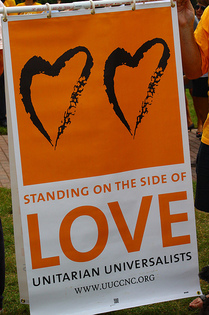 Standing on the Side of Love/Justin Valas While I am without an internet connection, Kate will post pieces I wrote in the past to speak as credos during service at the Unitarian Universalist church where I served as a Worship Associate
It hurts to say so, but I may not be an activist. On the side of love, I don’t stand or march or lie in the street or get arrested. Not that those who do shouldn’t.
I am in awe of the Bernal Heights occupy group that peacefully and with respect, look after the welfare of their neighbors. I, on the other hand, am more apt to be sitting and sipping a double soy latte, though, of course, still on the side of love. And in that spirit, I am “occupying” Starbucks with a diverse cast of coffee drinkers in the Fillmore Center. Here, I make it a point to connect with people who probably wouldn’t see things my way, even if they knew how I saw things.
On any topic, I am not as interested in convincing others of my view, no matter how misguided or wrong they may be, as I am interested in reflecting to them that they are people of consequence who matter.
The Unitarian Universalist principle of every person’s inherent worth and dignity supports me in this. But this is not to say that the homophobe on my right sipping his frappuccino has a good idea going for him. From my perspective, same sex marriage is a human right, and while our opinions are not the same, no bridge can be built between us as people of worth and dignity, unless I am willing to listen and talk to him in a way that bridges the divide.
I try to ask questions that make such a connection possible. People who hold ideas with which I disagree are worth engaging. They are, because if I can be present to them as an interested, accessible human being who is not judgmental, I may make an inroad into their inflexibility.
Sitting next to me is Danny. He is a religious fundamentalist hoping to convince me that we are living in the end times and if we have the right beliefs, we will see Jesus within the next 20 years or so. Or if not, and we die, we will be resurrected because if it can happen once it can happen twice.
Needless to say, I do not agree with Danny. The other morning he brought out notebooks and flipped through page after page of quotations from the Bible and his comments printed in large square letters. He searched for the one quote he was sure would convince me of the imminent reappearance of Jesus, the savior and Son of God. I said, “An interesting perspective and asked him, what his beliefs give him that makes his life better.” By shifting the focus from the beliefs themselves to why he chose to believe them, I hoped to engage him genuinely and not challenge or belittle what obviously matters to him. Eventually, if he asks me what I believe and I tell him, “As little as possible,” we could remain friends and continue to have conversations.
And it isn’t just with strangers that I have had to bridge divides. When I was with my girl friend, Corky, and we went to the movies, we would often disagree about the film. That is, she would disagree with me. My reaction was invariably anger, meaning hurt feelings. To me, her failure to validate my opinion meant I was not a person of consequence to her. Suddenly I looked at my disappointment and feelings and recognized them as familiar. So I didn’t yell, but breathed, sighed and said quietly, “Sorry, you are not at fault. It is never your fault. It will never be your fault.” She thought I was kidding. But that’s not her fault either. It never was her fault. Because time has passed and we are not together, I realize that fault was never an issue. It is always about remaining open to hearing other opinions and not needing another to validate me.
Perhaps, in some respect, all this sitting does make me an activist – actively seeking to connect from a position of inquiry rather than from an inflexible attachment to my own ideas, willing to listen and bend to better wisdom. Even, as is often the case, it’s not my own.
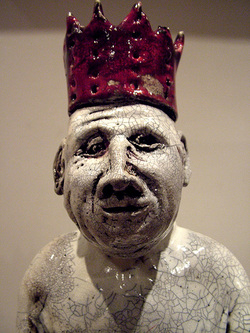 Sitting Man in Red Hat / Andrew Hill “The man in the red hat is not in charge” sounds like the title for someone’s musings. I’d be wise to use it before it’s registered with GoDaddy.com and becomes a web site.
The man in the red hat who is not in charge could have been the man in the red hat Saturday morning. Though not in charge, he popped up from his chair again and again to issue orders and to protest the inequity of a food distribution lottery system that has number 345 heading toward the food line well ahead of him, and he (who arrived early) holds number 47.
The mornings I assist at Old First Presbyterian Church staffing the Food Bank distribution to hundreds and hundreds of mostly Asian women, I leave exhausted; my mind awash in cultural stereotyping and colonialist sentiment.
As the man in the red hat charges toward the table where sit the volunteers, the loudest among us pleads with him and the other surging clients, “Please sit down.” As the morning wears on and the crowd of more than 300 repeatedly surges forward, the loudest voice among us resorts to chanting: “Sit down, sit down, sit down.” No one seems to understand, for certainly no one sits down.
When we are lucky, we have a Cantonese speaking 12-year old calling numbers, but often we make do with the loudest among us and a microphone. As “chalk mistress,” my work is to help Food Bank clients understand when it is their turn by writing numbers on a chalkboard as they are called over the handheld mike. I am not authorized to suggest a system that incorporates the times that people arrive into the lottery process.
I admit to experiencing irritation that none of us, myself included, has tried to learn one word of Cantonese and none of our clients seems to have picked up on such basic phrases as “Please show your ID” and “Stand in line, please.”
After a year of Saturdays, I have not been interested in learning why some cultures crowd and others willingly line up. I don’t want to hear stories some try to tell me about clients who receive “free” food and sell it, though I, myself, have not seen that happen. I don’t want such stereotypes to keep me constricted and not free to experience individuals like the man in the red hat.
But I do want to learn from wisdom traditions how to relate to the man in the red hat in a way that is empowering and acknowledges his inherent worth and dignity. Tara Brach calls such learning “the freedom to be who we are.” I will always observe behavior that baffles me; I can’t change cultural conditioning or what motivates my own compatriots to behave as they do. But when I acknowledge to myself all that I experience and feel, without pushing away unpleasant thoughts and experiences or grasping at the pleasant to make them last longer, I can see what is happening and know this is the way it is right now.
Having admitted to myself that I am finding this food distribution mission an unpleasant chore as well as a feel-good, do-good opportunity, I am free to be with all parts of my experience and use that spaciousness to inform my responses. I get to choose to whom or even if I will express frustration and negativity.
In the past, as part of my “self-improvement project” I felt obligated to push away insensitive thoughts, to be always on guard against judgments and negative stereotyping, to apply correct pronouns in all cases, in short to “be” a person I could accept and like.
But as I learn what it really means to be free, I realize I do not need to be without error or politically incorrect thoughts. True freedom is choosing not to shape, contort, or present myself to be what I think the world wants. Instead, I want to acknowledge my experience and thoughts, and then pause, as Tara puts it, to choose from kindness what to say, whom to say it to and when to say it. By accepting my limitations and not judging myself, I become kindness.
The man in the red hat is not in charge and neither am I. It is what it is.
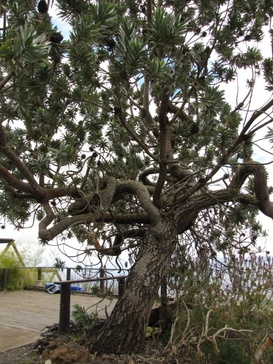 Habit at Waipoli Rd Kula, Maui/ Forest & Kim Starr I heard Jean Shinoda Bolen, M.D.* speak about social justice Friday night. The talk was a lot about trees and the people who love them and relate to them as “I-Thou” rather than “I-It”. Her recently published book Like a Tree: How Trees, Women, and
Tree People Can Save the Planet was a written response to losing a beloved tree in her yard when her neighbors complained that after they built on to their home it blocked their view and needed to come down. She told us that following many appeals, and while she was away at the United Nations World Conference on Women, the homeowners association felled the huge tree, leaving a stump in the yard. I admire her for directing her disappointment and anger at the loss of her tree into writing from the heart rather than being occupied by grievances she surely was entitled to feel when the tree became an “it” to the neighbor’s “I”. Hearing her thoughts about people and their relationship to the plant kingdom, I remembered reading Stanford professor Robert Pogue Harrison’s article “What it Means to Tend our Garden,” in which he maintains that cultivation and care comprise the essential transaction between Homo sapiens and the garden that is our world. “Our human gardens may appear to us like little openings into paradise in the midst of the fallen world, yet the fact that we must create, maintain, and care for them is the mark of the postlapsarian provenance….” Harrison goes on to say that banishment from the static Garden of Eden, which needed no mulching, no weeding, no watering, is the moment that initiated our true humanity. As has been my wont lately, I took the lessons inward to those instances of loss and uprooting that comprise being this person. Like Shinoda Bolen, rather than blame and regret what was wounding , I can choose to become what she calls a crone who doesn’t whine and get on with finding my “assignment,” the work of the heart that goes out into the world in the name of serving all beings. This care and cultivation of myself and all others fits with Harrison’s notion that the fall from the garden, that place of pre-knowing, sent us into true responsibility for all that is our world. There is such a cultivated garden in San Francisco, a man-made garden, Golden Gate Park, and within the park the arboretum where, as a docent, I learned how nature takes adversity and makes it rapturously beautiful. An example is protea, leucadendrom argenteum or silver tree. There are quite a few of them in the San Francisco Botanical Garden. When I trained in the garden, I met this tree and stroked the light-reflecting silky silver leaves. I saw how the silver-grey leaves, covered on both surfaces with thousands of tiny, soft, hairs and fringed with long white hairs gave off a silver sheen. I learned how in hot, dry weather, the leaves are at their most silver. The hairs lie flat to protect the leaves from drying out. In wet weather the hairs stand more erect to allow for free air circulation, yet still shimmer when light touches. The trees and many docent classes led me to admire the natural world that contains and causes adaptation. I felt in further awe upon learning that petal markings are not to make flowers look pretty but to serve as landing strips for pollinators, so they efficiently find their way to the nectar and continue the cycle of life which is what plants and pollinators are about. This week both Shinoda Bolen and Harrison were my pollinators. Their messages reminded me to tend the people and the earth around me, to foster an “I-Thou” relationship with the universe, to feel empathy for the neighbors who want their view more than they want the tree, and to love all that is my life, including my shadow elements that beg for attention. Add these words from Zen teacher Uchiyama: “Everything you encounter is yourself.” Thus all I meet in the world becomes a partnership between “I and Thou” because I will want to do unto myself as I do unto others. * Jean Shinoda Bolen is a psychiatrist, Jungian analyst, and an internationally known author and speaker who draws from spiritual, feminist, Jungian, medical and personal wellsprings of experience.
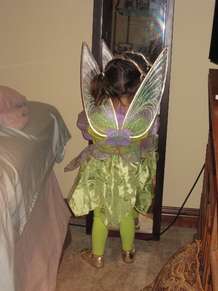 Miss E at Halloween/Dad “Throw the Toys at the Ceiling” is a game devised by my four-year-old granddaughter. It is a game for two to be played in the bedroom. When the toys hit the ceiling (unless she is throwing them and they don’t), they must land on her queen-sized bed (unless she is throwing them and they don’t.) I stipulate only stuffed animals can play with us to minimize damage on the field of play.
This is the first game Miss E wants to play when I arrive two Saturdays ago. Apparently this game had been a hit the first time we played it before she and her dad began travelling. A lot of time had passed between that time and this.
This stay with my son and granddaughter was short, a trip down on Saturday morning, returning Sunday afternoon. But enough child time to play her games and follow her instructions while issuing none.
One big joy of being with Miss E, even for a short time, is a chance for me to behold my own small self with the eyes of love. Experiencing Miss E as the center of attention reminds me of a poem I wrote about my own childhood. In “Circling the Wagons,” I expressed sadness that when I looked into the mirror, I saw my mother’s face and not my own.
Parents at their best make a world in which their children feel they matter and don’t just exist at their mother or father’s convenience. When E speaks, her daddy hears her. He allows her to interpret her own experiences. And I’m in awe of how he helps her say what she needs before she cries or whines. He is giving her the tools I am still learning to give myself, that space between feeling and reacting.
Near noon, Miss E, her daddy and I joined a group of her school chums for a birthday party in a pizza parlor. Though she has her own pizza, she doesn’t eat it. Instead she picks olives and tomatoes from my salad, then eyes the foil-wrapped chocolates on the table, surreptitiously unwrapping one though Daddy said not to. As the foil peels from the second chocolate, she leans toward me and whispers, “Don’t tell Daddy.” Part of me wants to say, “You know what Daddy said,” but it feels like a gift to be an accomplice to this little person.
After the party, I run beside her in the rain, grasping her hand to cross streets to a theater where my son deposits us to see “The Lorax” with other partygoers, parents, and grandparents. This time off from daddy duties is my gift to him, an hour or so to watch basketball on a big screen and drink beer with his friends.
As the theater darkens and I notice that my granddaughter is wearing a barrette with a feather that sparkles in the dark, I get what Margaret Mead meant when she said, “Everyone needs to have access both to grandparents and grandchildren in order to be a full human being.”
During my time with Miss E, it wasn’t all games. We watched Barbie in Mermaids 2. We watched it twice. Each time we chose which mermaids we were. And while we watched it, she instructed me to put together one of her jigsaw puzzles for ages 4+, while elbows on the table next to me, she colored pictures pink and purple. These she said would be gifts for a friend whose birthday party was on Sunday. Her dad and I praised her color choices and assured her that the birthday girl would adore these pink and purple pictures.
The next day after a reprise of Mermaids 2, we have time to go into her bedroom and put all the stuffed toys on her bed. Holding the tallest doll, she is Mommy, and I with the stuffed Santa, am one of many daughters. Apparently, all the children have colds except me, so I must do as Mommy tells me: help Mommy give medicine and carry my sisters while they recover. Miss E gives orders in her high little girl voice, and I give the Santa doll a high little girl voice too, although sometimes I whine because it seems to me that the other daughters are getting more attention.
When I am with this little girl, I touch the deepest part of my being. As part of the love that surrounds her and as I play with her, I simply allow things to unfold and pretend that I am that child who is flowering.
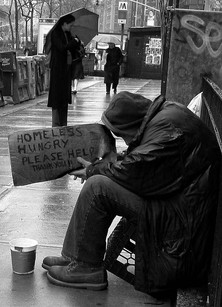 rock bottom / Lee Nachtigal He was tall, thin and wore a navy-blue wool cap that covered his ears. His scruffy one-legged companion was in a wheelchair, and when I came in to Starbucks at the Fillmore Center at 6 a.m., they were gathering their belongings, bags, and backpacks from the table for the handicapped. The tall younger man tottered toward the waste receptacle, sagging forward on bent knees. Behind the counter, Rob was watchful.
Suddenly, the man’s arms swept out to his sides and loudly he proclaimed, “We have come in out of darkness. We weren’t until we came in and your kindness gave birth to us.” And he went on, more to Rob than to me, “You can see this, can’t you? We were wandering in darkness and you let us come in.” And again, “Now we are born.”
I looked at Rob. His face mirrored the amazement on my own. To Rob I murmured, “I don’t do drugs, but if I did, that is the drug I want.” And we laughed in amazement.
On the sidewalk in the rain, the companion in the wheelchair waited impatiently. We could not hear him, but the look on his face led Rob to tell the poet that his friend was waiting for him.
Meanwhile, the poet was trying to pull a plastic newspaper sleeve over his head to keep his hat dry before joining his companion in the downpour. The plastic kept splitting, never opening wide enough to fit over the cap, and soon it was just torn and rumpled plastic sitting on top of his hat.
I have seen many scruffy wanderers warming themselves in this Starbucks, their belongings in plastic or paper bags, or they sit silently wrapped in soiled blankets. Not all of them are suddenly eloquent. Some, like Derrick, whose name we know, never speak but drum on the table to music we don’t hear or wave their fingers conducting the unseen. Some curse and curse until a barista asks them to leave.
Each morning into this café comes a parade of vagrants whom the light and warmth welcome. On this particular morning, the poet with plastic on his hat and his companion in the wheelchair put me in mind of lines from Jalaluddin Rumi’s poem, “The Guest House.”
This being human is a guest house
Every morning a new arrival.
A joy, a depression, a meanness,
some momentary awareness comes
as an unexpected visitor....
The dark thought, the shame, the malice,
meet them at the door laughing,
and invite them in.
Be grateful for whoever comes,
because each has been sent
as a guide from beyond.
This is not the whole poem. I skipped to the parts that connect the “guests at Starbucks” with the “guests” that frequently gust through me, the sometimes unwelcome, often uninvited thoughts or impulses and uncomfortable energies that call me their home. My own vagrants for whom I provide the light that gives them birth.
I’m not always delighted by the aspects of myself that seek to be acknowledged, but meditation teacher Pema Chodron instructs that one must cultivate unconditional friendliness and stick with oneself through thick and thin. This, of course, is easier when what I see is pleasant and acceptable. It is much more difficult to stay present and open and say “Welcome, come in” to the dark, the shameful, the malicious pieces of myself I have ignored or denied.
But I am committed to being a friend to both the acceptable and the painful pieces of me. Meditation instructions to meet each piece with gentleness make tending and befriending easier. So as I learn to stay open and present to whatever aspects of myself present themselves, I welcome all who seek the light of my consciousness. I invite them into my inner silence.
I love that meditation is a constant flow of saying yes to whatever comes to mind. When thoughts come by, I can note them gently and see them waft past. When strong and painful feelings land with a thud, I can hold them and bathe them in a stream of “yes, yes, yes.”
In some respects, being a meditating human is like being a welcoming café that opens early and is warm. All the guests who come may not be so desirable, but closed door or mind precludes so much.
Catholic mystic, Thomas Merton wrote: “Our job is to love others without stopping to inquire whether or not they are worthy. That is not our business and, in fact, it is nobody's business. What we are asked to do is to love, and this love itself will render both ourselves and our neighbors worthy.”
 Cappuccino made for me/A. Rittger When I am truly at one with the universe, having silenced all the spiky “shoulds,” I will be luminescent like an orange, with pits to spit out and juicy with gratitude.
Once I am at one with the universe, I won’t brag about reaching bliss. But should I become one with the universe, I will note it in my gratitude journal or text it to my gratitude buddy, Kate, as one of three gratitudes of the day we have agreed to exchange.
As for daily gratitude, I doubt my data plan allows for the number of text messages I would send to recount all for which I am grateful. Better to journal it and be okay with running out of pages.
Religions and philosophies have long trumpeted gratitude as a manifestation of virtue, and a component of health, wholeness, and wellbeing, while scientists are latecomers to recognizing gratitude’s salubrious effects.
Happiness researcher at UC Davis, Dr. Robert Emmons, calls gratitude the “forgotten factor”. They’ve designed a long-term research project to create and disseminate scientific data on the nature of gratitude, its causes, and its potential consequences for human health and wellbeing. A Harvard study showed 94 percent of depressed people reported feeling less depressed after 15 days of keeping a gratitude journal.
I will leave proving the efficacy of gratitude to the experts and do only what I can do which is, as the poet Rumi says in “The Zero Circle”: “… not be sure of anything besides ourselves, and only that….”
Left to my own devices, take my gratitude journal for Friday, February 24 for example. And then up pops “por ejemplo,” and I feel the big “G” for the ability to remember one of the few expressions I have mastered in another language. The “G” becomes the first letter of Google because I instantly check the spelling on an English-to-Spanish dictionary on my smart phone. Major gratitude for mastering the complexities of my particular portable go-to for almost everything, podcasts, the calendar, music, mail, etc. Which takes me to the earbuds, an alternative to Starbuck’s musical medley. Sometimes it’s okay and sometimes it’s not. I feel gratitude this morning as the voice of Mahalia Jackson pours from the speaker an upbeat gospel tune. The Christian coffee drinker at the end of the counter points it out to me. “Praise the Lord,” she says. “And in Starbucks, of all places.”
If you read me, you know I give all props to this particular spot in the Fillmore Center for the kindness of the young men and women who greet me on mornings I am there and worry when I’m not. This morning Rob does an unusually good job with my usual. I am grateful.
Gratitude to the 1997 Corolla that started this morning although the ignition switch is reluctant to turn over when prodded by the key. I feel grateful for not doubting that eventually the car will start even when the first two turns of the key are click, click nothing.
But worry and dismay cause pain. And I learned in meditation practice and through dharma talks that the stories I tell myself are not reality. Better to just wait until the car starts or doesn’t. Highest gratitude to that lesson. When I need to remind myself of the reality of reality, I just say iiwii (pronounce it the way it looks, like eerie without the “r.”). This shortcut helps me remember that It Is What It Is. I’m grateful for acronyms.
So the car started this morning. And eventually it took me to the drop box at the Main Library. I paused there for a moment, grateful that libraries hold my requested books until I come to get them, and if I’m not on time, send the books to the next avid reader. I am especially grateful for the drop box I access down Grove and then left on to Polk. Due on Friday was “The Great Night” by Dr. Chris Adrian, novelist and hematologist/oncologist at UC Berkeley. I loved both the book and the email reminding me to bring it back or pay a fine. All joy to the reader next on the waiting list.
It’s not yet noon, and the gratitude journal is filling. I will go to Patricia’s Green at Hayes and Octavia, carrying my own artificial sweetener because Royal Grounds coffee is the best and wouldn’t offer artificial anything with their wonderful coffee. I will enjoy a cappuccino made just for me and drink it, watching dogs romp in the park. Gratitude, Gratitude and Shanti, Shanti.*
 Apples not on aisle three/Alison R. Then the serpent said to the woman, “Behold the apples on aisle three.” And she did. And lo! the apples were not low in price. But being thus sorely tempted, her desire grew as the serpent well knew it would, and lo! the serpent spoke again. “Mmmm, Red Rome, your favorite.” And she was sorely, sorely tempted and did fill up the plastic sack with apples though they cost more than she had budgeted, and she abhorred plastic. The serpent sent her forth to check out by herself, hissing these instructions: “Placeth the apples on the weigh platform but key in a code for lower priced produce such as the red onion which looketh a lot like an apple yet costeth a dollar a pound less. Or put to memory the five digit code for organic Delicious apples which are rippling from age and, as a result, cost less. Lo! You saveth money and haveth apples. And the woman was sorely, sorely, sorely tempted. I have recreated (desecrated?) a portion of the Hebrew Creation Myth as a mature alternative to subverting the San Francisco Unitarian Universalist Worship Service on Sunday. My role in the service was limited to reading the story of Adam, Eve and the serpent rather than telling stories from life that allow me to exchange energy with the congregation as once we Worship Associates did as a regular part of Sunday service. That role is now closed to lay persons because the interim minister wants worship to be a performance of ritual and story rather than a confluence of sharing and relationship. Nothing amiss with that. Every minister wants to do what he wants to do. (He in the case of this congregation.) But it is not what I want to do. For me reading the Hebrew Creation Myth as part of a celebration of Charles Darwin’s 203rd birthday is interesting but not heart-engaging. In worship I want to feel heart-energy flow between speakers, be they minister or lay, and “the beloved community”. That then is background and the inspiration for this retelling of a “true” story of my experience in the Safeway at Webster and O’Farrell. When God saw the woman had been seduced by a slithery serpent, He caused the check out machine to balk mid transaction and sent forth the checker in charge of all self-check out to wave her card across the face of the machine and lo! the transaction was null and void. Driven from self-check out, no longer under the sway of the serpent, yet chafing under the unfairness of a free market economy, I queue up in the fifteen-items-or-less line and don a face of good will for Gail or Audrey as they perform the early morning check out ritual. Waiting for the line to snake forward, I grapple with the many minor injustices I suffer. Take microwaveable popcorn. If I want to purchase microwave popcorn in boxes of four small bags at a discount, but can only get that discount on three-baggers with really big bags, then my needs are not met. Where’s the fairness in that? And store-brand flavored carbonated water is advertised as on sale at a price ten cents higher than it was yesterday. Moreover there’s a California-added tax that will appear at checkout. But I need that flavored no-calorie water to drink Naked or Odwalla. Without the carbonated water to dilute Mighty Mango or Very Berry, each glass is expensive and again, I cannot get my needs met. Where’s the fairness in that? As for apples, Red Rome, though high in cost are less desirable than Fuji apples, which are plentiful and often on sale. Don’t I deserve a break for clearing the shelves of unpopular apples before they ripple and no one buys them even at a reduced price? And as Gail or Audrey scans my Safeway card, I sigh, forgive myself and remember that ours is “a world full of unruly impulses.”* It’s certainly so when I consider how tempted I am to cause harm when the world doesn’t meet my needs. The minister with his own agenda, and the Safeway with its profit motive. Luckily, I avoided the temptation of cheating the market or subverting the Sunday worship service to demand “Meet my needs!” * Avivah Zornberg is a celebrated author and Torah teacher who reads between the lines of sacred stories to uncover deeper layers of meaning. Listen to her discussion “The Genesis of Desire” with Krista Tippett at On Being.
 Smashed glass at Starbucks/Alison R. Until the police release their final report, we won’t know how the glass was broken, if it shattered from multiple kicks, a brick or the intruder used a hammer.
As I crossed the Safeway parking lot on my way to the Starbucks on Fillmore and O’Farrell, Doug, a regular who sits next to me at the counter, met me in the Safeway parking lot and said don’t bother going to Starbucks. Go to Safeway instead because Starbucks won’t open.
I could have done as Doug suggested, but I wanted to see for myself why my usual morning routine was spoiled, if the store wasn’t open and wouldn’t be open and if not, why not. So we walked over and I read for myself the handwritten sign on the front door: “Closed because of an incident.”
That could have meant anything. I had watched April earlier in the week stare down a potential thief and order her to get in line if she wanted to buy something. The woman had been standing near the sandwiches for some time. I have no store smarts so didn’t guess the woman had anything on her mind but ordering a tall coffee and gazing at the glazed donuts. To me, abberant behavior means customers are probably off their meds.
But April sees her job as protecting the store, so she sees loitering by the open food displays while yelling out an order for a drink from a distant coffee spigot as a theft in the making.
Based on having witnessed the shouting match that ensued between the polite yet firm April and the enraged would-be thief, I imagined a payback kind of incident wherein April is possibly accosted and Chang or Kim have to subdue the angry interloper, etc. etc.
But I put that story on hold after walking around the building and seeing the shattered glass. Half a door remained. Through a side window I could see a policeman dusting the counter for prints. When I caught April’s eye, I raised my shoulders to ask what had happened, if everyone was all right and when were they planning to reopen.
She shrugged in response but gestured that she would make my usual beverage for me and bring it outside the front door. By this time, quite a crowd had gathered, and I had become a spokesperson on the basis of exchanging shrugs with April and having seen for myself the smashed glass.
Pretty soon the entire Starbucks crew came out the front door with trays of coffees for everyone, saying it’s free and we are sorry for inconveniencing you. April handed me my double short soy latte.
When one of the other regulars reached into his pocket to pay, April said, “Derrick, your coffee is free.” That she knew his name and fixed him what he liked impressed me because Derrick is homeless and sleeps in the vicinity of Fillmore and O’Farrell. Moreover, he hasn’t always come into the store medicated.
Meanwhile Kim, the manager, brought out creamers and an assortment of sugar and sugar substitutes plus stirring sticks for anyone who didn’t take their coffee black.
We learned that besides a showcase of coffee blends in disarray, nothing was taken, not even the few dollar bills from the tip jar. In the back, boxes had been thrown, as if the thief or thieves were looking for something. April said because too many people who worked in the store touched objects and surfaces, fingerprints would yield no clues.
And I learned what I already knew, even if Starbucks does not have the best coffee and the décor of every store is basically the same, this particular coffee shop is a community. No one working for a paycheck is required to treat other people with kindness. Whether biblical: Do unto others or Buddhist: practice loving-kindness, or just good business sense, the result that cold morning was the same.
By the following morning, the door had been boarded up and the store opened at its usual 5:30 a.m. When I showed Chang, part of the Saturday crew, pictures of the shattered door and the trays of coffee set out on tables for those of us who couldn’t be regulars that morning, he was impressed. “Not many businesses would do that,” he said. And though no expert, I had to agree.
|










 RSS Feed
RSS Feed